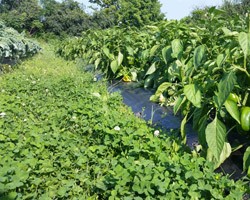Living Mulch Project Update
Judson Reid, Extension Vegetable Specialist
Cornell Vegetable Program

For several years the Cornell Vegetable Program has worked with winter grains such as rye between rows of plastic beds as a living mulch. However, rye seemed to decrease crop yield, as well as break down too early to control late season weeds. A number of studies and colleagues suggested the inclusion of clover into the system. These benefits include:
- Late season weed control.
- Grains provide adequate shade to allow the clover to establish and early season weed control (on its own clover will not provide early season weed control).
- Clover as a legume can provide some of the nitrogen the grains require, potentially decreasing nutrient competition with the vegetable crop.
- Clover may attract less lepidoteran pests than grains.
With funding from NESARE in 2014 we established 4 living mulch treatments between rows of peppers on a cooperating farm in Penn Yan, NY. Our observations to date support the inclusion of clover in the living mulch. For example when included with both barley and rye, the clover plots had much less weed growth than the grains alone. Rye+Clover has given the best weed control, although we are noticing a trend of increased weeds in all plots as the season progresses.
Yield differences also support the inclusion of clover, which when combined with rye yielded nearly twice as much as rye alone. There are however no significant differences in number of fruit per plot, indicating the living mulch may influence fruit size.
At this point we believe living mulch can provide very good weed control in plasticulture vegetables. Among the combinations we've examined so far this year rye+clover seems to emerge as our top choice.
The Cornell Vegetable Program thanks NESARE and the cooperating farmers for their support of this project.
Living Mulch Project Update (pdf; 417KB)


































